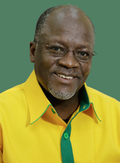| Order of Mwalimu Julius Kambarage Nyerere | |
|---|---|
| Type | Single grade Order |
| Established | December 2011 |
| Country | Tanzania |
| Ribbon | |
| Status | Currently constituted |
| Statistics | |
| Total inductees | 5 |
| Precedence | |
| Next (higher) | None |
| Next (lower) | Order of the Uhuru Torch |
The Order of Mwalimu Julius Kambarage Nyerere (Swahili : Nishani ya Mwalimu Julius Kambarage Nyerere) is an award of the Tanzanian Honours System for retired presidents elected democratically. [1] [2] It is named after Julius Nyerere, the nation's first president.




